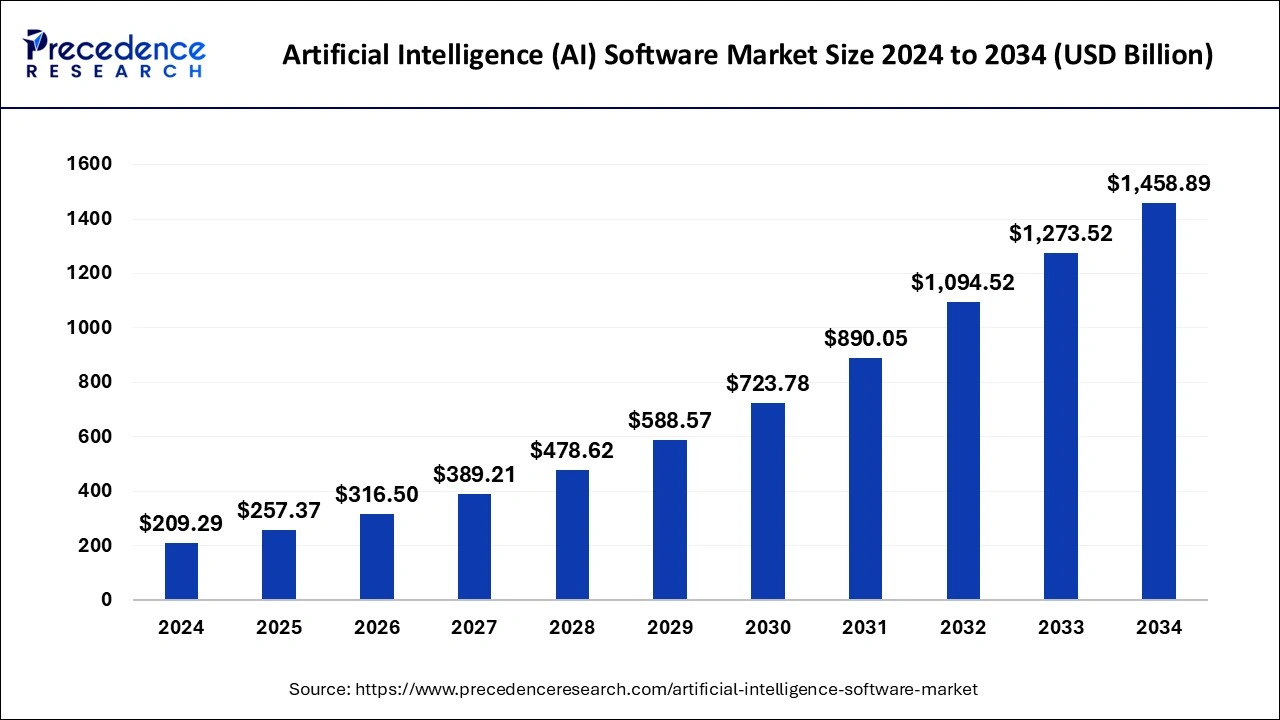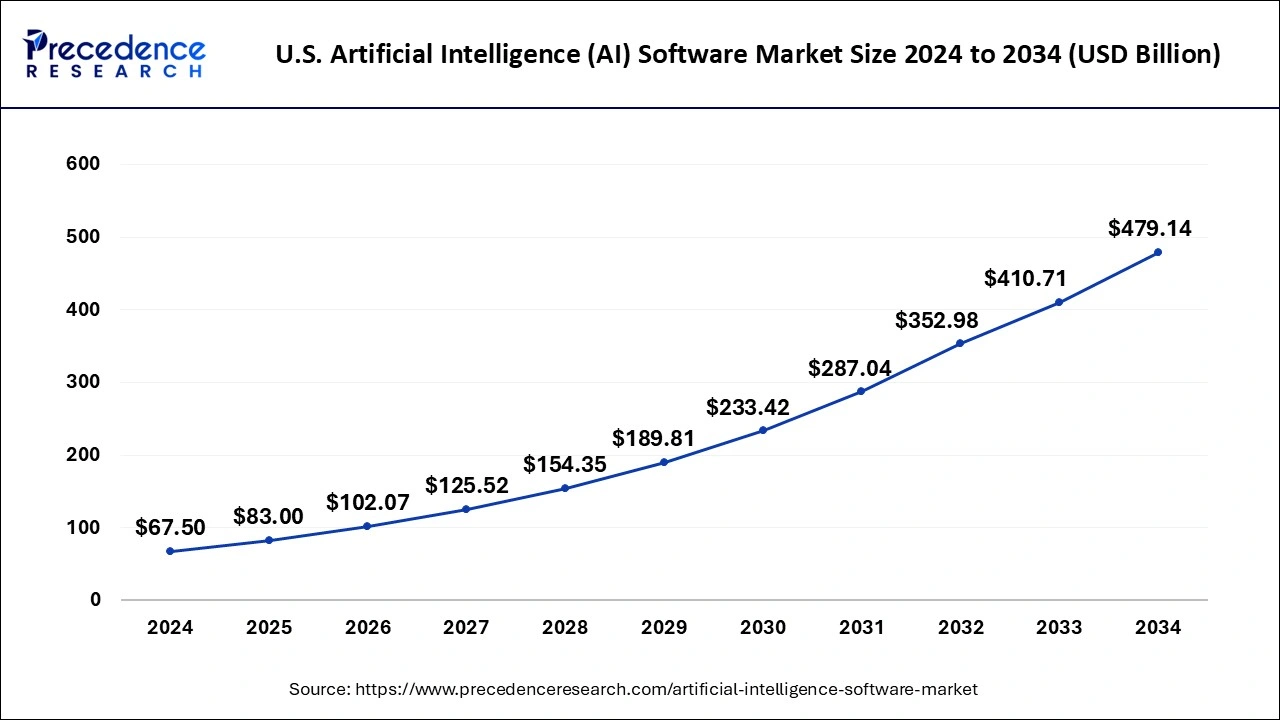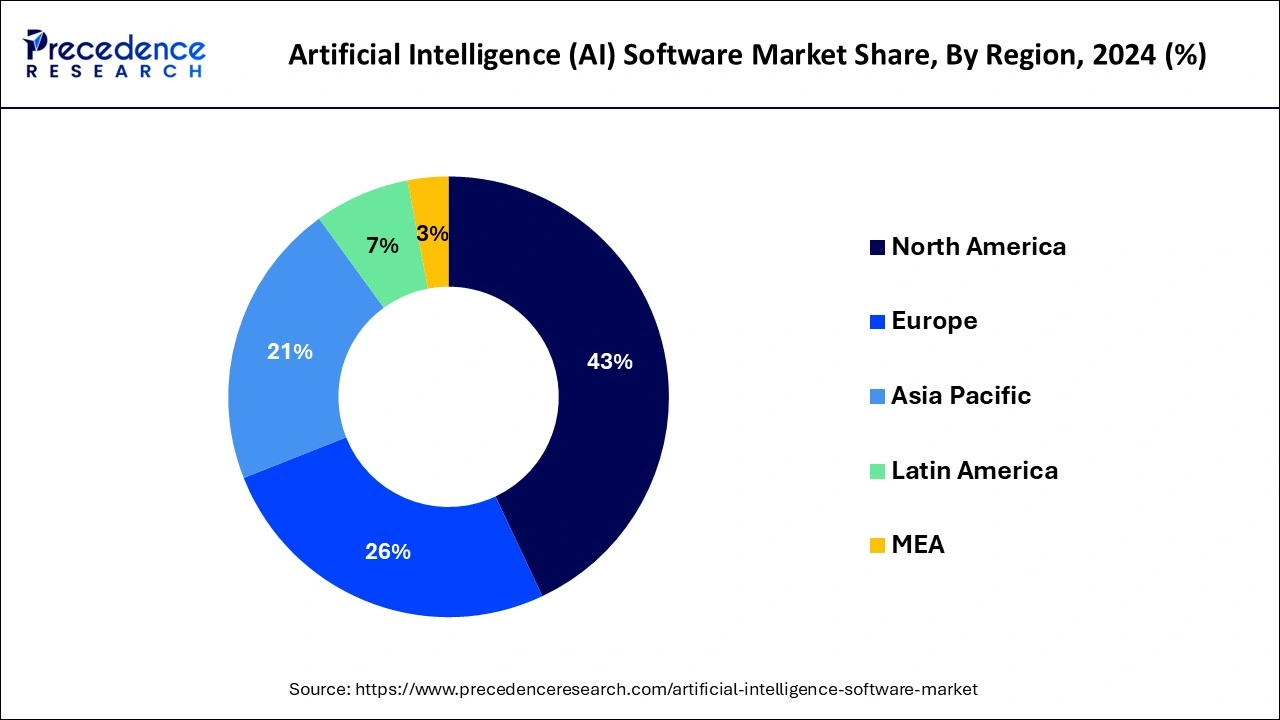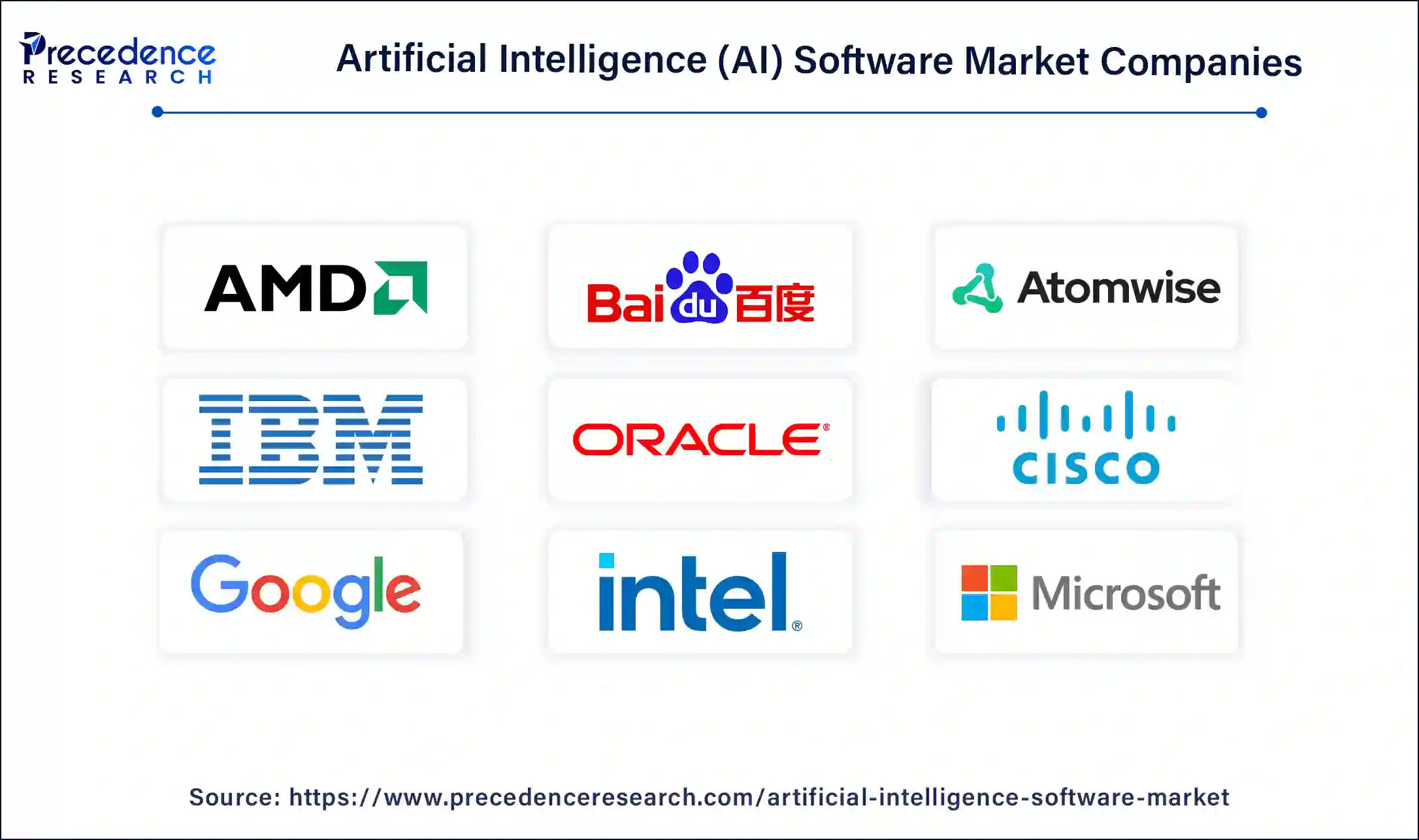Artificial Intelligence (AI) Software Market Size and Forecast 2025 to 2034
The global artificial intelligence (AI) software market size accounted for USD 209.29 billion in 2024 and is anticipated to reach around USD 1458.89 billion by 2034, growing at a CAGR of 21.43% from 2025 to 2034. The artificial intelligence (AI) software market is growing due to the strong involvement of AI in almost all industries.

Artificial Intelligence (AI) Software Market Key Takeaways
- North America dominated the global artificial intelligence (AI) software market with the largest market share of 43% in 2024.
- Asia Pacific is expected to expand at a solid CAGR of 2% during the forecast period.
- By deployment model, the cloud-based segment led the market in 2024.
- By offering , the software segment accounted for the highest market share in 2024.
- By application, the voice processing segment hold the significant market share in 2024.
U.S. Artificial Intelligence (AI) Software Market Size and Growth 2025 to 2034
The U.S. artificial intelligence (AI) software market size was evaluated at USD 67.50 billion in 2024 and is predicted to be worth around USD 479.14 billion by 2034, rising at a CAGR of 21.65% from 2025 to 2034.

By region, the artificial intelligence software market is segmented into North America, Europe, Asia Pacific, Latin America, Middle East & Africa. Geographically,North Americadominated the global artificial intelligence (AI) software market with the largest market share of 43% in 2024,due to rising investments. The North American region's manufacturing, retail, and healthcare industries have shown significant growth in the artificial intelligence software market during the post-Covid-19 pandemic. The implementation of 5G technology is projected to boost the artificial intelligence software market in the Asia Pacific region. The presence of major key players in China, such as Huawei, Baidu, Inc. & Alibaba Cloud, push the artificial intelligence software market towards growth.

The market in the Middle East region is expected to grow in upcoming years with the government's noticeable initiatives. The Saudi Arabian government has developed Saudi Data and AI Authority (SDAIA), which aims to position Saudi Arabia in the top 10 countries in artificial intelligence.
Market Overview
Artificial intelligence, with its supercomputer vision, has changed the landscape for many industries across the globe. Artificial intelligence software is capable of learning, reasoning, perception, problem-solving, and many other intelligent behaviors. This artificial intelligence software learns various data and works accordingly. Artificial intelligence software has features of a virtual assistant, machine learning, voice recognition, and speech recognition. Artificial intelligence software acquires h human-like behavior or intelligence, which enables it to perform tasks as humans do.
Artificial intelligence software is a perfect combination of mathematical functions and complex algorithms. Artificial intelligence software is used in cars, smartphones, social media feeds, banking, video games, and many other applications of our day-to-day lives. Artificial intelligence software provides machines with advanced capabilities to find perfect solutions.
Considering the advancement in technology all over the globe, many businesses in multiple sectors have adopted artificial intelligence software to enhance their performance and to get better insights into the business. Due to the rising demand for artificial intelligence software, the AI software market is likely to grow in the forecast period of 2023-2032.
Artificial intelligence software is integrated into various sectors such as banking, IT & telecommunication, automotive, healthcare, and many others. With its capacity to detect threats, artificial intelligence software is primarily used in banking, retail, and IT & telecommunication sectors to protect against cyber threats to consumers. During the Covid-19 pandemic, industries such as retail, manufacturing, and transportation investments in the artificial intelligence software market. Artificial intelligence solutions such as Qualcomm, AWS Chatbots, Open AI Codex, and Azure AI have gained demand in the market from corporate companies to improve business operations. The artificial intelligence software market is likely to grow in the upcoming period.
Market Scope
| Report Coverage | Details |
| Market Size in 2025 | USD 257.37 Billion |
| Market Size by 2034 | USD 1458.89 Billion |
| Growth Rate from 2025 to 2034 | CAGR of 21.43% |
| Base Year | 2024 |
| Forecast Period | 2025 to 2034 |
| Largest Market | North America |
| Segments Covered | By Deployment Model, By Offering, By Application, By End-User |
| Regions Covered | North America, Europe, Asia-Pacific, Latin America, Middle East & Africa |
Market Dynamics
Rising demand for improved business IoT solutions, self-driving cars, and robots will likely drive the growth of the artificial intelligence software market. Artificial intelligence software is one of the most efficient ways to reduce human efforts consumption; thus, it is integrated into most fields, from healthcare to defense. Along with this, many prominent companies are launching new artificial intelligence software to sustain themselves in the artificial intelligence software market.
Considering the factors such as reduced risk, proper data management, improved production efficiency, reduced disruptions in the supply chain, and gained end-to-end visibility of operations that artificial intelligence software provides, the market is expected to show significant growth in the forecasted period of 2025-2034.
The artificial intelligence software market is widespread and carries multiple drivers. The unfolding market for 4IR technologies, such as the Internet of Things, robotics, or quantum computing, will fuel the artificial intelligence software market. Multiple enterprises are investing in artificial intelligence software to plan and implement business strategies and for better customer support. Rapidly increasing adoption of artificial intelligence software is seen as a major driver for the market.
The artificial intelligence software used in the healthcare sector (hospitals, clinics, and labs) enhanced the overall experience of work. Rising demand for artificial intelligence software from the healthcare sector will likely fuel the market in the upcoming years. Upgrading technology is also providing lucrative opportunities for market growth. By integrating artificial intelligence software into cyber security, businesses see it as a significant safeguard against cyber-attacks to protect their networks and confidential data. The demand for such software in the cyber security branch is another driver for the artificial intelligence software market. Artificial intelligence software is capable of providing an improved customer experience. Many companies are adapting artificial intelligence software to provide better customer service. Collectively, increasing investment in advanced artificial intelligence software is a considerable driver for the artificial intelligence software market.
Driver
Rising investment in AI start-ups
The future expansion of the artificial intelligence (AI) software industry is anticipated to be driven by the growing investments in AI startups. Businesses that focus on creating and deploying artificial intelligence (AI) solutions to address particular issues or satisfy consumer needs are known as AI startups. Due to the growing need for AI solutions across sectors, as well as their scalability and cost-effectiveness, investments in AI companies are expanding. By supporting marketing and sales initiatives, investments in AI startups will help AI businesses grow their market share and promote the use of software solutions.
Restraint
Artificial intelligence technology is being admired globally, and the limited skill set for implementing proper artificial intelligence software is seen as a major restraint for the artificial intelligence software market. Lack of technical expertise for such complex management hampers the growth of the artificial intelligence software market. The algorithms in artificial intelligence technology depend on the input data, and any unintended mistakes in input data can disrupt the programming of artificial intelligence software. Such incidents are seen as another restraint to the growth of the artificial intelligence software market.
Opportunity
Usage of generative AI
In addition to being ground-breaking tools, generative models, machine and deep learning algorithms, and artificial intelligence (AI) enable developers to push the boundaries of technology, produce individualized experiences, optimize workflows, and spur creativity. Utilizing generative AI's capabilities may greatly enhance internal operations, business processes, software development, and product creation. There are several advantages to using AI in software development, including increased creativity, code optimization, and the exploration of novel ideas. Additionally, by streamlining processes and automating time-consuming, repetitive tasks, generative AI may increase productivity and efficiency across the product development lifecycle.
Deployment Model Insights
The artificial intelligence software market is segmented into On-premises and Cloud models. Cloud-based artificial intelligence software has multiple perks, including high scalability and reduced operation costs. Cloud deployment for machine learning in artificial intelligence software is projected to boost the market in the forecast period of 2025-2034
Multiple vendors such as Amazon, Google & IBM use the cloud for real-time analytics to ease the work. With the increasing need for cloud-based tools, the cloud segment will likely show significant growth in the forecasted period. Another benefit of cloud deployment is it allows access remotely. In contrast, the in-premise deployment allows extensive storage options.
Offering Insights
The artificial intelligence software market is segmented into Hardware, Software & Services. The software is likely to hold the largest market revenue share due to its ability to extract data and provide real-time analytics. It also supports the decision-making process. Google Cloud Machine Language is a prominent example that offers software-type solutions. However, the hardware in the artificial intelligence software market shows significant growth due to its capacity to enhance the efficiency of the process.
Application Insights
The artificial intelligence software market is segmented into Voice processing, Text processing & Image Processing. Among all these applications, the voice processing application has gained recognition with its intelligent assistant. The voice processing artificial intelligence software uses natural language processing. The voice processing application can handle hands-free requests that allow customers to get real-time service from the company. Thus, this type of application enables companies to provide improved customer service. Google Now, Siri, and Alexa are a few examples of voice-processing artificial intelligence software in the market. In contrast, text processing is used in the automation of analyzing electronic texts. This processing is used in language-related tasks. Artificial intelligence software uses image processing to analyze images to identify data.
End-User Insights
The artificial intelligence software market is segmented into Healthcare, BFSI, Law, Retail, Advertising and Media, Automotive & Transportation, Agriculture, Manufacturing, and Others. The advertising and media segment accounted for a revenue share of around 21% in 2024. After the Covid-19 pandemic, the healthcare sector has shown predictable growth in the artificial intelligence software market with the rapidly increasing adaptation of artificial intelligence software. In upcoming years, the BFSI and retail sectors are seen as major vital players in the artificial intelligence software market. The increasing demand for artificial intelligence software to fight against cyber-attack and fraudulent activities and to provide improved customer service are a few reasons to drive the market in these sectors.
Furthermore, artificial intelligence software is rapidly being used in the automotive industry for self-driven car design, manufacturing, and AI-based solutions and production.
Artificial Intelligence (AI) Software Market Companies

- Advanced Micro Devices
- Baidu, Inc.
- Atomwise, Inc.
- International Business Machines Corporation
- Oracle
- Cisco
- Google LLC
- Intel Corporation
- Microsoft
- Lifegraph
- Cyrcadia Health.
Recent Developments
- In January 2025, according to PitchBook statistics, artificial intelligence businesses have played a major role in helping the U.S. venture capital industry rebound from market lows. In 2024, the total amount of cash raised was about 30% greater than the previous year. A record 46.4% of the $209 billion funded last year went to AI businesses, up from fewer than 10% ten years ago.
- In January 2025, with an average check size of $0.5 million, Riceberg Ventures, a venture capital firm, intends to invest in 25–30 firms worldwide. Spacetech, medtech/life sciences, cybersecurity, AI, robots, new energy, semiconductors, and quantum computing are the industries they want to invest in. The company underlined the importance of helping deeptech firms, which sometimes struggle to get capital because of their lengthy R&D and incubation times.
- In June 2024, in order to support the startup ecosystem and advance the creation of safe and dependable AI solutions, Cisco Investments, the international corporate venture investment division of Cisco (NASDAQ: CSCO), established a $1 billion AI investment fund. To yet, Cisco has committed around $200 million of the $1 billion investment fund.
Segments Covered in the Report
By Deployment Model
- On-premises
- Cloud
By Offering
- Hardware
- Software
- Services
By Application
- Voice Processing
- Text Processing
- Image Processing
By End-User
- Law
- Retail
- Healthcare
- BFSI
- Advertising and Media
- Automotive & Transportation
- Agriculture
- Manufacturing
- Others
By Geography
- North America
- Europe
- Asia-Pacific
- Latin America
- Middle East & Africa (MEA)
 Get a Sample
Get a Sample
 Table Of Content
Table Of Content